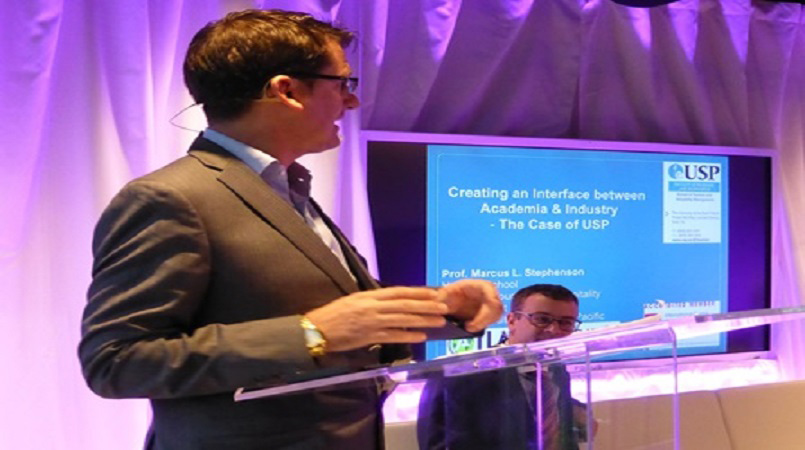
The University of the South Pacific’s (USP) School of Tourism and Hospitality Management (STHM) was part of the 9th annual International Panel of Experts (IPoE) Forum, entitled: ‘Real World Learning in Tourism and Hospitality’.
The forum was organised by the International Centre of Excellence in Tourism and Hospitality Education (THE-ICE), hosted by Stenden Hotel Management School, Stenden University of Applied Sciences in Leeuwarden (the Netherlands).
THE-ICE is an Australian-based accreditation agency, which specialises in the accreditation of higher education programmes in tourism, hospitality and events at a range of top quality
Professor Marcus Stephenson delivers his presentation at the International Panel of Experts Forum organised by THE-ICE institutions around the world. Its focus is on ensuring institutions and degree programmes are quality driven to strong standards of excellence.
STHM’s academic programmes are fully accredited by THE-ICE, recognising that their courses meet the THE-ICE Standards of International Excellence.
Head of STHM, Professor Marcus Stephenson was one of four keynote speakers delivering on the topic of ‘Industry Interface’, a panel that was chaired by Guy Bentley, the CEO of Glion Institute of Higher Education Worldwide, Montreux, Switzerland.
Professor Stephenson presented a STHM case study concerning: ‘Creating an Interface between Academic and the Industry: The Case of USP’. It initially focused on a holistic approach and identified ways in which higher education institutions can encourage industry associations, such as having a systematic input into curriculum design, programme architecture and programme delivery. Also, industry representation in the evaluation and assessment process, the role of internship programmes, and the function of careers fairs and interview forums, were all highlighted as best practice examples of the interface between industry and academia.
“Importantly, communication structures between education and industry are essential, where systematic industry engagement and communication is the key. One important reason why STHM is successful in ensuring that its work is in close harmony with the industry is partly because it has a good community engagement programme,” he said.
Professor Stephenson also noted that, “it is of fundamental importance that STHM continues to encourage strong synergies with industry so that our students can locate sound employment opportunities, especially in relation to the service sector industries.”
Chief Executive Officer of THE-ICE, Pauline Tang, said, “forum participants have thoroughly enjoyed Professor Stephenson’s presentation, and especially his sharing of information on how STHM work in close cooperation with the industry. We respect the commitment in the quality assurance of the School’s programmes and ability in embracing the socio-economic challenges in the region.”
